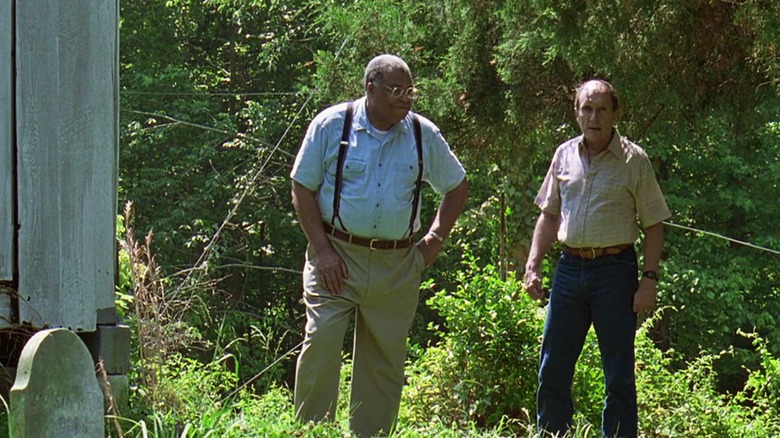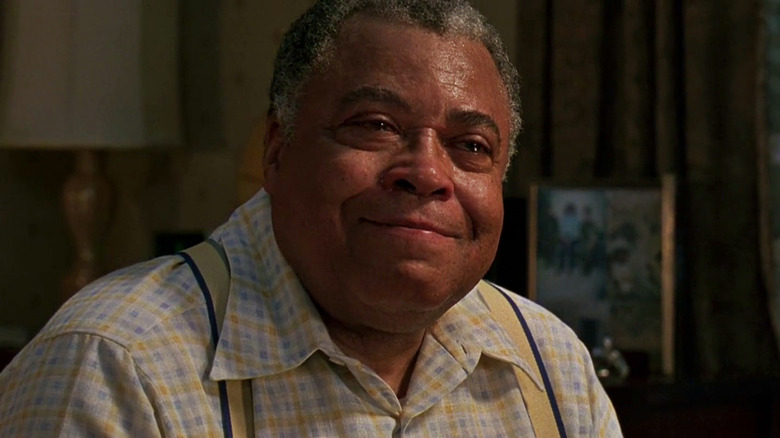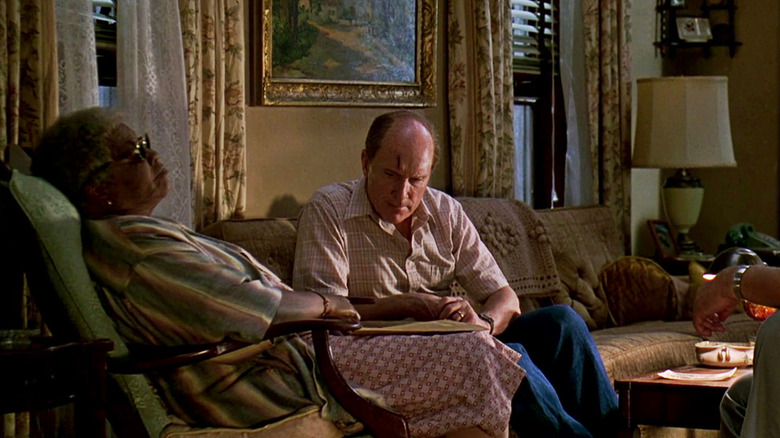The Forgotten Family Drama You Didn't Realize Landman's Billy Bob Thornton Wrote
As a cinephile, one of my favorite things to do is rediscover underseen and forgotten gems directed or written by big-time Hollywood actors. It's akin to finding gold in places you walked by a thousand times before but never bothered to look at them closely. That's how I discovered Robert Redford's fascinating historical masterpiece "Quiz Show" a few years ago, and the same way I found Richard Pearce's heartfelt 1996 family drama, "A Family Thing," written by Billy Bob Thornton and Tom Epperson. Thornton and Epperson actually collaborated on several screenplays — including the cult classic crime flick "One False Move" and Sam Raimi's mystery horror "The Gift" — throughout their careers. "A Family Thing" came just before the former's celebrated directorial debut, "Sling Blade," which he wrote and won an Oscar for in 1997.
I bring up "Sling Blade" because the film shares some important roots with "A Family Thing." Both movies are about Arkansans having to face painful losses and hard truths. In the latter, Earl Pilcher (Robert Duvall), a simple man from a small Arkansas town, has to say goodbye to his ailing mother on her deathbed, who leaves behind a curious letter to let her son know that she wasn't his biological mother. His real ma was their maid, Willa Mae, a black woman who's been raped by Earl's white father and died giving birth to him. As a man in his 60s (who lived his whole life thinking he was white), the news rocks the entire foundation of Earl's world. The letter also states he has a half-brother named Ray (James Earl Jones), a policeman living with his family in Chicago. And the deathbed wish of Earl's mama is for him to find and get to know his sibling.
Earl is torn by what to do, but he's too decent of a feller to ignore his mom's final wish. So he packs up his truck along with the ambivalent feelings that are circling in his heart, and heads to the big city to find some answers.
A low-key yet intriguing story that refused to become Oscar bait
I know what you're thinking: today a movie like this would have a relentless Oscar campaign around it that could quickly turn it into schmaltz, emphasizing how a redneck comes to terms with and embraces his half-blackness at his old age. Perhaps they could've done that in the '90s as well, but fortunately, that's not the main focus of "A Family Thing." Sure, Earl is conflicted about his newly-discovered origin that muddles his entire identity, but despite all his anger and resentment, he makes an effort to get to know Ray even if he's hostile and aggrieved toward him at first.
Duvall plays Earl with pride and manliness but finds a way to let kindness and vulnerability seep through that hard shell he's been wearing for 60-odd years. He's as volatile and short-tempered as anyone would be in his shoes after such a revelation, but also respectful and considerate enough to not blame his brother (and his family) for the sins of his own (especially his father's). Given Duvall's multi-layered performance, it's not that surprising that the seed of the story actually came from him (according to Epperson), having wanted to play a half-black character for some time. But it wouldn't work as well as it does without Jones, who brings to life the kind of old-fashioned, strict yet tender-hearted African-American you don't see much anymore.
When they meet, Ray hates Earl since he's always been blaming him for his mother's death. But he gradually warms up to the man because he senses that his intentions and emotions are pure — coming from a place of confusion, curiosity, and feeling lost. There's a scene where the two men share stories of their childhood, the Korean War they served in, and the losses they've suffered. They open up to each other in a way that makes their differences, hatred, and skin colour secondary. They talk as two human beings connected by blood but separated by time, trying to find common ground and build a bond. And when they do, it feels like old Hollywood magic that caresses the soul like nothing else. They have no agendas, ulterior motives, or anything to gain other than a connection. It's meaningful cinema at its best.
They don't make 'em like that anymore
I couldn't go on without mentioning Irma P. Hall, who plays the siblings' blind and wise Aunt T, helping them find a resolution even if she has to scold and force them to put aside their bitterness and pain and act like good brothers should. She's key to the story, the bridge that connects and neutralizes the racial divide, teaching his nephews (and us) that reconciliation and forgiveness are as vital to life as the air we breathe. The scene where she recounts the night of Earl's birth is both beautiful and heart-wrenching, the final nudge that Ray and Earl need to fully accept and appreciate each other as brothers. It also perfectly sets up the quietly heart-breaking and peaceful ending as the two return home, where their lives began, to pay respect to the woman that none of them truly knew or got enough time to spend with. No big words are being said, but their simple gestures are eloquent enough to capture the sorrow and warmth that vibrate through their every move. After 60 years, they make peace with their past and each other.
It's a shame Thornton and Epperson don't work together much these days (their last co-written screenplay was 2012's "Jayne Mansfield's Car"), but it also makes us treasure overlooked gems like "A Family Thing" more for that reason. A traditional, bittersweet, and endearing little movie that never tries too hard to play on our heartstrings, and in return, it fares much better than most family dramas about broken and estranged relationships.


